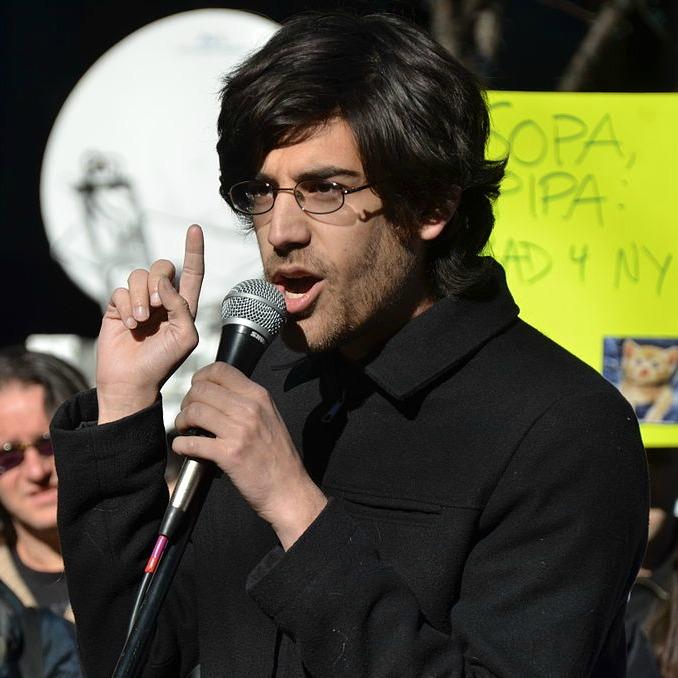BROOKE GLADSTONE: Late last week, 26-year-old hacker, programmer and activist Aaron Swartz hanged himself. He had a history of depression and faced federal prosecution for hacking MIT's computer network to run a script that would download millions of academic articles. In his teens, he was already a force in the open Internet movement, and he never let up.
AARON SWARTZ: There's a battle going on right now, a battle to define everything that happens on the Internet in terms of traditional things that the law understands. Is sharing a video on BitTorrent like shoplifting from a movie store, or is it like loaning a videotape to a friend? Is reloading a Web page over and over again like a peaceful virtual sit-in, or a violent smashing of shop windows?
BROOKE GLADSTONE: But his commitment to an open Internet landed him in serious legal trouble when he was arrested for downloading millions of articles from the online article repository, JSTOR. Over JSTOR's own objections, a federal prosecutor charged Swartz with wire fraud, computer fraud, unlawfully obtaining information from a protected computer, and more. Adrian Chen wrote an article for Gawker called, “The Death of Aaron Swartz and the New Hacker Crackdown.”
ADRIAN CHEN: He was an activist, he was a writer and he was a builder who created all sorts of programs, large and small. Most notably, he was one of the original programmers behind Reddit, the social news site. So he was really kind of a, a Renaissance man of the digital age.
BROOKE GLADSTONE: His willingness to commit civil disobedience has led some to liken him to Henry David Thoreau.
ADRIAN CHEN: This was not his first time having a brush with the law. In 2008, he downloaded millions of documents from PACER, the online court document system, and faced an investigation that actually didn't end up in charges. Anybody who's done any research using PACER knows that it's incredibly clunky and it charges you for every document you download, so essentially it's just a huge hassle to get these documents that should be public knowledge.
BROOKE GLADSTONE: Describe the JSTOR case.
ADRIAN CHEN: Well, JSTOR was kind of an obvious target, I think, for somebody like Swartz. JSTOR is a massive database of academic research. It's a nonprofit that was set up by a consortium of universities to store all of this research and charges access fees to different institutions.
BROOKE GLADSTONE: It's not cheap.
ADRIAN CHEN: No, it's definitely something that, you know, an individual can't afford. So he is accused of downloading four million documents, something like 33 gigabytes of academic articles, and prosecutors allege that he was gonna upload them to file-sharing websites.
BROOKE GLADSTONE: But ultimately, he gave those articles back to JSTOR. JSTOR said that it had, quote, "no interest in this becoming an ongoing legal matter." But the federal prosecutors felt very differently.
ADRIAN CHEN: It really gets to the heart of a conflict that has been going on since the beginning of the Internet, which is what is the Internet for? On the one hand, you have people like Swartz and hactivists like Anonymous who believe that it should just be a place where information is completely free; anybody can access it. And then, on the other hand, you have people like Ortiz, the federal prosecutor, and JSTOR that need a more orderly Internet, where information is actually protected and people who try to liberate information are punished.
Federal prosecutors are really trying to crack down on that, and any kind of computer crime like this is, is something that's gonna be a big target for them.
BROOKE GLADSTONE: So they wanted to make an example of him.
ADRIAN CHEN: Yes.
BROOKE GLADSTONE: What sorts of penalties did he potentially face, and what was he likely to face?
ADRIAN CHEN: He potentially faced as many as 35 years in prison and a million dollars in fines. It turned out that he had been offered a plea deal for just six months in prison. He would have still had to plead guilty to 13 felony charges.
I think a lot of the public outcry over this has been over the maximum sentence and, and the maximum penalties. And one of the things that's come out of this is a movement to reform laws so that people wouldn't face such harsh penalties for what Aaron Swartz did.
BROOKE GLADSTONE: So tell me, what has resulted from his death so far?
ADRIAN CHEN: Immediately after his death, a, a petition went up on the White House site to remove Carmen Ortiz, the head of the office that, that prosecuted him, and it got tens of thousands of signatures in a matter of days. One of the more concrete things that's happened is that a representative introduced something called Aaron's Law to limit the penalties and try to avoid a disproportionate punishment, like Aaron was facing.
But I think it goes bigger than just prosecutorial overreach. It gets to this fight over what the Internet's supposed to look like. Another thing that's happened on Twitter mostly is that academics have been posting PDFs of their academic work in honor of Swartz and his cause of liberating this information. They've used hashtag #pdftribute.
BROOKE GLADSTONE: Adrian, thank you very much.
ADRIAN CHEN: Thank you.
BROOKE GLADSTONE: Adrian Chen is a writer for Gawker.
AARON SWARTZ: If we lost the ability to communicate with each other over the Internet, it would be a change to the Bill of Rights, the freedoms guaranteed in our Constitution. The freedoms our country had been built on would be suddenly deleted. New technology, instead of bringing us greater freedom, would have snuffed out fundamental rights we'd always taken for granted.
